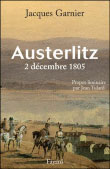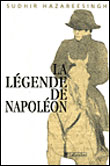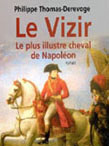| |
| |
For 2006, the Fondation Napoléon's annual HISTORY PRIZES for works of history on the two French empires have been awarded to the following authors:

|
|
|
| |
FONDATION NAPOLEON GRAND PRIX AND FIRST EMPIRE PRIZE 2006
Jacques Garnier: Austerlitz, 2 décembre 1805, Paris: Éd. Fayard
From Tolstoy to Abel Gance, Austerlitz is as much a battle of legend as of history. Whilst it is true that Napoleon's military genius was driven to its greatest achievement against the double enemy – Austria and Russia, the outcome was not however a forgone conclusion.
Jacques Garnier here recounts in exhaustive detail, hour by hour, the prelude, the plan and the course of Napoleon's most famous battle.

|
|
|
| |
SECOND EMPIRE PRIZE 2006
Sudhir Hazareesingh, La légende de Napoléon, Paris: Éd. Tallandier
How did collective consciousness manifest its attachment to the emperor post 1815, what was the effect of this manifestation on French national culture? The book is based on many previously unexploited sources, and in it the author describes popular celebrations of the Napoleonic legend and shows how Napoleon was sometimes the incarnation of liberty and sometimes that of the protector of the Nation. In this subtle picture of the ideological and social complexity of the Napoleonic legend, the reader is given a new interpretation of the history of the 19th century.

|
|
|
| |
 |
 |
PRIZE FOR A BOOK IN A LANUGUAGE OTHER THAN FRENCH 2006
Michael Broers : The Napoleonic Empire in Italy, 1796-1814: Cultural Imperialism in a European Context, Basingstoke: Ed. Palgrave Macmillan
This book takes a close view of the development of French Imperialism in Italy 1796-1815. Using the vocabulary of extra-European imperialism, words such as cultural imperialism, acculturation, assimilation, integration, and pacification, Broers considers each region of Napoleonic Italy in turn, namely, Piedmont, Liguria, Parma/Piacenza, Tuscany and the Papal States. Always the overarching question is: how and why did the Italians reject the effectively Revolutionary program of “regeneration” pursued by the French in Italy. In the first part, Broers considers the French ‘invasions' of Italy, over the long period of 1796-1809. The second part deals with the problem of the new French regime in Italy and in particular the crucial interfaces where French and Italians came up close. It is entitled the “Phantom of integration”. Its central section is a detailed discussion (region by region) of Italian integrational difficulties with respect to the French imperial administration. The central discussion is related to the French policy of amalgame in Italy. The third part takes on the idea of cultural imperialism in a European context. It takes as it bedrock the change in imperial policy from the integration/amalgame of the earlier period to the assimilation (often enforced) of the latter. It also charts Italy's fundamental rejection of France's desires to “improve” Italy, and tries to plot the roots of Franco-Italian estrangement always with its attention firmly fixed on the problem as to why the Italians in the end rejected the French regime.

|
|
|
| |
PRIZE FOR A WORK OF FRENCH FICTION 2006
Philippe Thomas-Derevoge : Le Vizir, le plus illustre cheval de Napoléon, Paris : Éd. du Rocher
“Vizir” was given to the emperor in 1804 by Selim III, sultan of Turkey, and he was soon to become THE horse in Napoleon's stables. Vizir was both brave and faithful and followed the emperor to the end of the Empire. Indeed, he was to outlive his master, dying in 1826. According to legend, the horse held at the Paris Musée de l'Armée is the very same animal…

|
|
|
| |
RESEARCH GRANTS 2006
Every year, grants are awarded to students beginning PhDs on First or Second Empire subjects. This year the following research projects were supported:
First Empire
• Arnaud Denis: The Pope's apartment at the Château de Fontainebleau: a study of the architecture and the furniture, Supervisor: Professor Yves Carlié, École du Louvre;
• Rémy Hême de la Cotte: The sovereign's religious service and his religious personnel in France during the Empire and the Restoration (1804-1830), Supervisor: Professor Jacques-Olivier Boudon, Université de Paris IV - Sorbonne;
• Benoît Roger: Frenchmen in Poland (1806-1808). A two-year relationship of liberation and occupation, Supervisors: Professors Bernard Gainot, Panthéon – Sorbonne Paris I, and Andrzej Nieuwazny, Université Nicolas Copernic Torun;
• Chantal Serène: The relationship between stage costumes and clothing fashions during the First Empire (Opéra, Comédie Française), Supervisor: Professor Jacques-Olivier Boudon, Université de Paris IV- Sorbonne.
Second Empire
• Camille Mestdagh: The Beurdeley dynasty, collectors, merchants and manufacturers of 19th-century fine furnishings, Supervisor: Professor Bruno Foucart, Université de Paris IV - Sorbonne.
• Flavie Seznec de Montgolfier: Théodore and Albert Ballu, architects, Supervisor: Professor Bruno Foucart, Université de Paris IV - Sorbonne.
The Fondation Napoléon Grand Prix and History Prizes 2006 were awarded on 21 November, 2005, at a very pleasant lunch in the presence of HIH, the Princess Napoléon.
For further information concerning the prizes, please email us.
Interested in the work of the Fondation Napoléon? Why not participate, either generally or in a specific project, by making a donation.
© this Napoleon.org weekly bulletin is published by the Fondation Napoléon. Reproduction or all or part of this bulletin is forbidden, without prior agreement of the Fondation Napoléon.

|
|
|
|
|
|
|
|
The Fondation Napoléon Grands Prix, the fruit of the generosity of the industrialist, Martial Lapeyre, are awarded by a jury composed of the following specialists:
• Victor-André Masséna, Prince d'Essling (President)
• Jean-Claude Lachnitt (general secretary)
• Anne Muratori-Philip
• Gabriel de Broglie, of the Académie Française, and Chancelier of the Institut
• Jean-Marie Rouart, of the Académie Française
• Jean Favier, of the Institut
• Professor Jean Tulard, of the Institut
• Professor Jacques-Olivier Boudon, president of the Institut Napoléon
• Professeur François Crouzet
• Professeur Bruno Foucart
• Jacques Jourquin, vice-president of the Institut Napoléon
• Docteur Jean-François Lemaire
Four Grands Prix, each of 8,000 Euros, are awarded. Of these four prize-winners, the jury then chooses the overall winner, the “Grand Prix de la Fondation Napoléon”, awarding a further 7,000 Euros.
=> click here to discover the previous winners.
Furthermore, the same jury awards awards six research grants worth 7,600 Euros to six French or non-French students in the first year of their PhD (or MPhil intending to go on to PhD) on First or Second Empire subjects.
=> click here for the previous research grant winners.
<<
|
|




